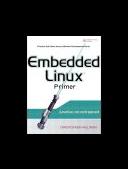
Comprehensive Real-World Guidance for Every Embedded Developer and Engineer
This book brings together indispensable knowledge for building efficient, high-value, Linux-based embedded products: information that has never been assembled in one place before. Drawing on years of experience as an embedded Linux consultant and field application engineer, Christopher Hallinan offers solutions for the specific technical issues you're most likely to face, demonstrates how to build an effective embedded Linux environment, and shows how to use it as productively as possible.
Hallinan begins by touring a typical Linux-based embedded system, introducing key concepts and components, and calling attention to differences between Linux and traditional embedded environments. Writing from the embedded developer's viewpoint, he thoroughly addresses issues ranging from kernel building and initialization to bootloaders, device drivers to file systems.
Hallinan thoroughly covers the increasingly popular BusyBox utilities; presents a step-by-step walkthrough of porting Linux to custom boards; and introduces real-time configuration via CONFIG_RT--one of today's most exciting developments in embedded Linux. You'll find especially detailed coverage of using development tools to analyze and debug embedded systems--including the art of kernel debugging.
• Compare leading embedded Linux processors
• Understand the details of the Linux kernel initialization process
• Learn about the special role of bootloaders in embedded Linux systems, with specific emphasis on U-Boot
• Use embedded Linux file systems, including JFFS2--with detailed guidelines for building Flash-resident file system images
• Understand the Memory Technology Devices subsystem for flash (and other) memory devices
• Master gdb, KGDB, and hardware JTAG debugging
• Learn many tips and techniques for debugging within the Linux kernel
• Maximize your productivity in cross-development environments
• Prepare your entire development environment, including TFTP, DHCP, and NFS target servers
• Configure, build, and initialize BusyBox to support your unique requirements
6.2.2. Resolving Dependencies
6.2.2. Resolving Dependencies
It is not sufficient to simply include an executable such as init on your file system and expect it to boot. For every process you place on your root file system, you must also satisfy its dependencies. Most processes have two categories of dependencies: those that are needed to resolve unresolved references within a dynamically linked executable, and external configuration or data files that an application might need. We have a tool to find the former, but the latter can be supplied only by at least a cursory understanding of the application in question.
An example will help make this clear. The init process is a dynamically linked executable. To run init, we need to satisfy its library dependencies. A tool has been developed for this purpose: ldd. To understand what libraries a given application requires, simply run your cross-version of ldd on the binary:
$ ppc_4xxFP-ldd init
libc.so.6 => /opt/eldk/ppc_4xxFP/lib/libc.so.6
ld.so.1 => /opt/eldk/ppc_4xxFP/lib/ld.so.1
$
From this ldd output, we can see that the PowerPC init executable in this example is dependent on two libraries. These are the standard C library (libc.so.6) and the Linux dynamic loader (ld.so.1).
To satisfy the second category of dependencies for an executable, the configuration and data files that it might need, there is little substitute for some knowledge about how the subsystem works. For example, init expects to read its operational configuration from a data file called inittab located on /etc. Unless you are using a tool that has this knowledge built in, such as those described in the earlier Section 6.1.6, "Automated File System Build Tools," you must supply that knowledge.




